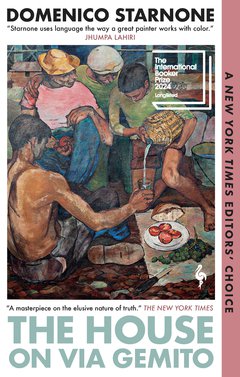Domenico Starnone
The House on Via Gemito
The book
LONGLISTED FOR 2024 THE INTERNATIONAL BOOKER PRIZE
A BEST BOOK OF 2023
A NEW YORK TIMES EDITORS’ CHOICE
This extraordinary Strega Prize-winning novel confirms Domenico Starnone’s reputation as one of Italy’s greatest living writers. Told against the backdrop of Naples in the 1960s, a city that itself becomes a vivid character in this lush, atmospheric novel, The House on Via Gemito is a masterpiece of Italian fiction, one that is steeped in Neapolitan lore.
A modest apartment in Via Gemito smelling of paint and turpentine. Its furniture pushed up against the wall to create a make-shift studio. Drying canvases moved from bed to floor each night. Federí, the father, a railway clerk, is convinced that he possesses great artistic promise. If it weren’t for the family he must feed and the jealousy of his fellow Neapolitan artists, nothing would stop him from becoming a world-famous painter. Ambitious and frustrated, genuinely talented but also arrogant and resentful, Federí is scarred by constant disappointment. He is a larger-than-life character, a liar, a fabulist, and his fantasies shape the lives of those around him, especially his young son, Mimi, short for Domenico, who will spend a lifetime trying to get out from under his father’s shadow.
Starnone, a finalist for the National Book Award with Trick, author of New York Times notable book of the year, Ties, and the critically acclaimed Trust, takes readers beyond the slim, novella-length works for which he is known by American readers to create a vast fresco of family, fatherhood, and modern Naples.
the Italian Ministry of Culture’s Centro per il libro e la lettura.

The author
Domenico Starnone
Domenico Starnone is considered by many to be Italy’s greatest living author. He is the author of fifteen best-selling works of fiction, including: Ties, a New York Times Editors’ Pick and Notable Book of the Year, and a Sunday Times and Kirkus Reviews Best Book of the Year; Trick, a Finalist for the 2018 National Book Award and the 2019 PEN Translation Prize; and, Trust, “a short, sharp novel that cuts like a scalpel to the core of its characters” (LA Times). All three of these novels were translated by Pulitzer Prize-winner, Jhumpa Lahiri.
Starnone’s Strega Prize-winning novel, The House on Via Gemito (Europa, 2023), translated by Oonagh Stransky, was named a Washington Post and Kirkus Reviews Best Book of the Year and a New York Times Editors’ Choice, and was long-listed for the 2024 International Booker Prize. In 2024, again in Stransky’s translation, Europa released The Mortal and Immortal Life of the Girl from Milan, which the New Yorker described as “wonderfully off-kilter.” His short stories have appeared in the Paris Review, the New Yorker, and the Georgia Review. His most recent novel is The Old Man by the Sea. Starnone is the recipient of many of Italy’s major literary prizes, including: the Strega prize, the Napoli prize, and the Campiello prize.
Press
- May 27 2024
“Monumental.”
— Reading in Translation - Apr 2 2024
“Contemporary masterpiece.”
— Evening Standard - Jan 18 2024
“A memento mori of sorts.”
— Rain Taxi Review of Books - Jul 12 2023
“Readable and elegant.”
— Times Literary Supplement - Jul 12 2023
“Exuberant.”
— On the Seawall - Jul 12 2023
“Richly detailed.”
— The Washington Post



